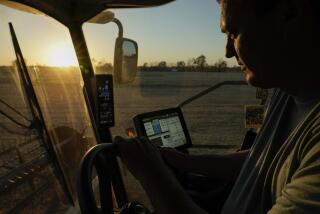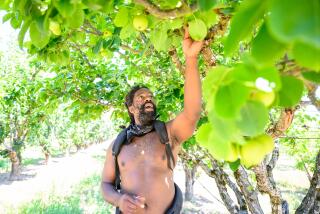America the Bountiful Has Been Farmers’ Undoing
The American farmer is currently experiencing the biggest farm depression in 50 years.
There are a number of reasons for this predicament, among them an overvalued dollar that has priced us out of foreign markets and made us the supplier of last resort; the lack of free access to foreign markets due to protectionist tariffs erected by foreign governments, and the subsidies that foreign governments give their farmers in order to assure them a minimum price for their crops even if the world price is lower.
But consider another factor: American farmers themselves. The farmers’ ego, boosted with more than a little help from our government, has been their undoing. Every advancement that American agriculture made, it gave away. The American farmer taught the world how to farm--at no charge.
If a country wanted to increase yields, it was given our new seed varieties. The United States sent teams abroad to teach the modern miracles of fertilizers and then helped finance foreign building of fertilizer plants. We sent teams to teach about erosion. When foreign farmers had bugs, we sent insecticides. If there were weeds, we sent herbicides. We taught foreigners how to plant, grow, combine, mill, gin, package, can and sell. We even helped them build dams, irrigation systems and sold them tractors at subsidized rates. And when our agricultural competitors wanted to see how the American farmer operated, we took them into our homes, fed them, gave them gifts, and showed them demonstrations of our techniques, complete with pictures.
And all this was going on at a time when the cost of our land, labor and water was slowly rising. Eventually, the cost of growing our crops became much higher than that of our students--or more precisely, our competitor nations.
We had educated them and given them all of our scientific advances. Today, that makes about as much sense as IBM giving free use of its patents to its competitors.
The rest of the world can now produce the major crops for less than we can. Argentina, for instance, almost sold wheat in the United States at a price cheaper than Kansas farmers can sell it. China, until two years ago, imported our cotton. Now it grows enough to be an exporter. Many rice-growing countries used to import American rice; now they are self-sufficient and offer their surplus for sale on the world market. India, Pakistan and Thailand are now self-sufficient in wheat and are offering their surplus for export.
Meanwhile, our bins are full of grains that we can’t sell.
The first goal of any emerging nation is to become self-sufficient in food. Once this is accomplished, the economy can be held in a more or less stable condition. Excess production can be sold or traded for other necessities. Real growth is achieved with a favorable balance of payments.
A nation’s leaders naturally want high food production and low prices. This makes everyone happy except the farmer--he’ll go broke under these conditions. So what to do? The government subsidizes the farmer to the point that he can come back next year with hopes for higher prices. Sorry, Mr. Farmer; except in the occasional event of worldwide weather disasters, you’re never going to make it. If you do, the whole society may crumble.
The farmer loves his life style. He’s admired because he works long, hard hours, breathes clean air, lives out in the open, drives a pickup. But he’s also become dependent on the government for a quick fix for all his problems. If prices get too low, the government is expected to bail the farmer out. If a storm tears up his crops, the government gives him low interest loans. If there is a drought, the government lends him money. Its the same for a flood, a freeze, a fire. If the farmer wants to make improvements to his land, the government will help him irrigate, drain or put up windbreaks. Dream it up and Uncle Sam will finance it, including even taking the land out of production.
Why? To assure a plentiful supply of cheap food--enough to feed half the world.
The only problem is that the bottom has fallen out. Half the world doesn’t need our food, or can’t pay for it. As that credit so lavished on our farmers comes due, foreclosures result.
Meanwhile, the export of our technology continues unabated.
American agricultural technology is one of our nation’s most valuable assets. We must stop giving it away. Technology should not be sold but treated as a national resource. We should also consider slowing down the funding of agricultural research. If we have anymore agricultural technological breakthroughs, we may not be able to recover.
The paradox is that we don’t want anybody to starve, but we just can’t figure out who is going to pay for the cost of the food. The American farmer is like everybody else; he has to make money to stay in business. Feeding the rest of the world now means that he is in danger of starving himself.
More to Read
Sign up for Essential California
The most important California stories and recommendations in your inbox every morning.
You may occasionally receive promotional content from the Los Angeles Times.










